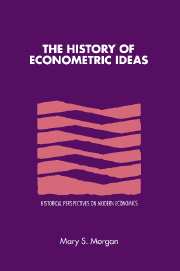Introduction
Published online by Cambridge University Press: 26 October 2009
Summary
Econometrics was regarded by its first practitioners as a creative synthesis of theory and evidence, with which almost anything and everything could, it seems, be achieved: new economic laws might be discovered and new economic theories developed, as well as old laws measured and existing theories put to the test. This optimism was based on an extraordinary faith in quantitative techniques and the belief that econometrics bore the hallmarks of a genuinely scientific form of applied economics. In the first place, the econometric approach was not primarily an empirical one: econometricians firmly believed that economic theory played an essential part in finding out about the world. But to see how the world really worked, theory had to be applied; and their statistical evidence boasted all the right scientific credentials: the data were numerous, numerical and as near as possible objective. Finally, econometricians depended on an analytical method based on the latest advances in statistical techniques. These new statistical methods were particularly important for they gave economists of the early twentieth century ways of finding out about the world which had been unavailable to their nineteenth-century forebears, ways which, in themselves, seemed to guarantee scientific respectability for econometrics.
So, when econometrics emerged as a distinct activity at the beginning of the twentieth century, its use of statistical methods and data to measure and reveal the relationships of economic theory offered a form of investigation strikingly different from those of nineteenth-century economics, which ranged from the personal introspection and casual observation of classical economics to the detailed empiricism of historical economics.
- Type
- Chapter
- Information
- The History of Econometric Ideas , pp. 1 - 12Publisher: Cambridge University PressPrint publication year: 1990



